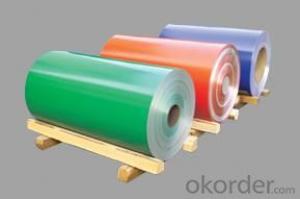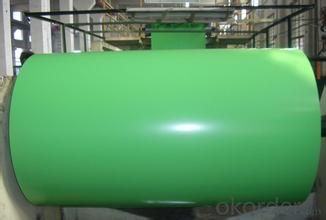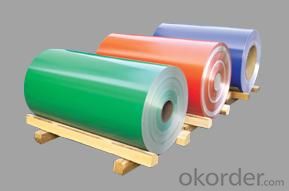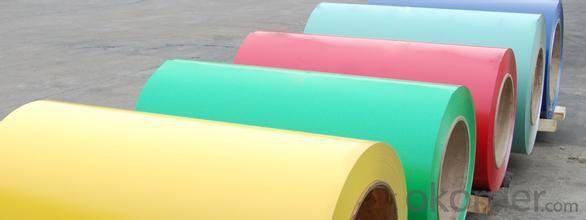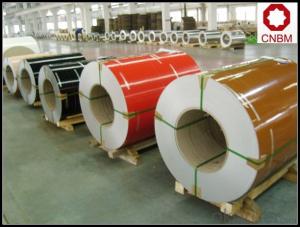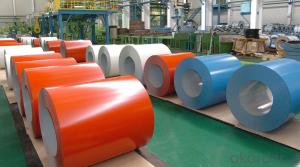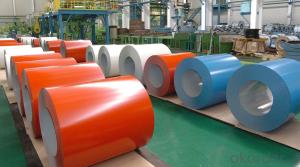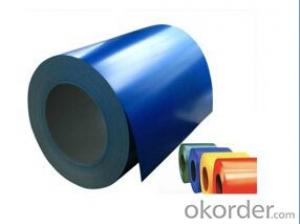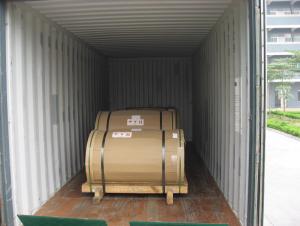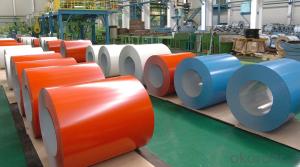024 Aluminum Coil - Prepainted Aluminum Coil for Vehicles & Transport
- Loading Port:
- China Main Port
- Payment Terms:
- TT OR LC
- Min Order Qty:
- -
- Supply Capability:
- -
OKorder Service Pledge
OKorder Financial Service
You Might Also Like
Aluminium is a relatively soft, durable, lightweight, ductileand malleablemetalwith appearance ranging from silvery to dull gray, depending on the surfaceroughness. It is nonmagnetic and does not easily ignite. A fresh film ofaluminium serves as a good reflector (approximately 92%) of visible lightand an excellent reflector (as much as 98%) of medium and far infraredradiation. The yield strength of pure aluminium is 7–11 MPa,while aluminium alloys have yield strengths ranging from200 MPa to 600 MPa. Aluminium has about one-third the densityand stiffness of steel. It is easily machined,cast, drawn and extruded.
Aluminium alloys (or aluminum alloys; see spellingdifferences) are alloysin which aluminium(Al) is the predominant metal. The typical alloying elements are copper, magnesium,manganese,silicon,tin and zinc. There are twoprincipal classifications, namely casting alloys and wrought alloys, both of which are furthersubdivided into the categories heat-treatableand non-heat-treatable. About 85% of aluminium is used for wrought products,for example rolled plate, foils and extrusions.Cast aluminium alloys yield cost-effective products due to the low meltingpoint, although they generally have lower tensile strengthsthan wrought alloys. The most important cast aluminium alloy system is Al–Si,where the high levels of silicon (4.0–13%) contribute to give good castingcharacteristics. Aluminium alloys are widely used in engineering structures andcomponents where light weight or corrosion resistance is required
Specification:
Alloy: AA1050, 1060, 1100,AA3003, 3005, 3015, 5052, 5754, 5083,8011, etc
Temper:H14/16/18/22/24/32, HO etc.
Thickness:0.2mm—100mm
Width: 100mm—2300mm (Can be slitted)
InnerDiameter: 508MM
Coil Weight:500kg-3000kg(Max.)
Application:Foil stock, Circles, Roofing, Can stock, Marine plate,Anti-slipery purpose in vehicles, packing and appliance.
Features:
1. Excellent quality of products
2. Quick delivery
3. Best service to clients
4. BV,SGS avalible
5. No buckle o waveness
6. Tension leveling
7. Certificate of Origin
8. Form A,E
Packaging Detail:
Carton ,Woodenpallet with plastic protection packing ,standard seaworthy packing or as yourrequest.
ProductionCapacity:
AnnualProduction capacity of 600,000 tons.
Products areexported to United States, Canada, U.A.E, Brazil, Mexico,Thailand, Vietnam,Nigeria etc, over 100 countries andregions all over the world.
Production Line:
CNBM aluminumproduction base is comprised of 18 aluminumannealers, 10 coil and foilmills, 4 continuous production lines, 2hot rolling production line and 3prepainted lines.
FAQ:
1. What is the form of payment?
Normally 30% TT, L/C
2. Type of quotation?
FOB, CFR, CIF
3. Port of loading?
Shanghai port
4. Delivery time?
30 day after client’s deposit
- Q: How long do aluminum coils typically last?
- Aluminum coils typically have a lifespan of around 15 to 20 years. However, the longevity of the coils greatly depends on several factors such as the quality of the aluminum used, the installation process, and the maintenance and care provided. Regular maintenance, such as cleaning the coils and ensuring proper airflow, can significantly extend their lifespan. Additionally, environmental factors like exposure to harsh weather conditions and corrosive substances can also affect their durability. Therefore, while aluminum coils have a decent lifespan, it is essential to provide proper care and maintenance to ensure their longevity.
- Q: What are the common surface treatments for aluminum coils in the automotive industry?
- Some common surface treatments for aluminum coils in the automotive industry include anodizing, painting, and powder coating.
- Q: How are aluminum coils joined in a continuous process?
- Various techniques, including welding, brazing, and adhesive bonding, are utilized in the continuous process of joining aluminum coils. Joining aluminum coils through welding is a widespread method. It involves melting the coil edges and subsequently merging them. This can be accomplished through different welding processes, such as TIG welding, MIG welding, or laser welding. These welding methods establish a sturdy and long-lasting bond between the coils. Brazing is an alternative technique employed for joining aluminum coils. It entails heating the coils and utilizing a filler material with a lower melting point than aluminum to create the joint. The filler material, typically a brazing alloy, is applied to the joint area. Upon heating, it liquefies and flows into the gap between the coils, creating a solid bond as it cools. Adhesive bonding is also employed during the continuous joining of aluminum coils. This approach involves applying a specialized adhesive or glue to the coil surfaces that require joining. The adhesive is chosen meticulously for its exceptional bonding properties with aluminum. The coils are then pressed together, and the adhesive undergoes curing, resulting in a robust and dependable bond. Each joining technique possesses distinct advantages and is selected based on factors such as application requirements, the aluminum type used, and the desired level of strength and durability. The choice of joining method in a continuous process relies on the specific demands of the production line and the final product.
- Q: What are the different types of surface coatings for aluminum coils?
- Aluminum coils can be treated with various surface coatings, each serving different purposes. These coatings safeguard the aluminum against corrosion, improve its appearance, and enhance its durability. The most common surface coatings for aluminum coils are as follows: 1. Polyester: Polyester coatings are widely favored for their ability to retain color and resist fading. They provide a smooth, glossy finish and are commonly employed in architectural applications. 2. Polyvinylidene Fluoride (PVDF): PVDF coatings are highly durable and weather resistant. They exhibit exceptional resistance to UV radiation, chemicals, and abrasion, making them suitable for outdoor use and harsh environments. 3. Epoxy: Epoxy coatings possess good adhesion and chemical resistance. They find frequent application in industrial settings where corrosion protection is vital, such as chemical processing plants and marine environments. 4. Polyurethane: Polyurethane coatings are renowned for their durability and resistance to abrasion. They are often utilized in high-traffic areas or applications where the aluminum surface is subject to frequent contact or wear. 5. Acrylic: Acrylic coatings offer reliable weather resistance and color retention. They provide a smooth, glossy finish and are commonly used in architectural and decorative applications. 6. Plastisol: Plastisol coatings, a type of vinyl coating, exhibit excellent corrosion resistance and flexibility. They are frequently employed in applications where the aluminum surface must withstand bending or forming without cracking or peeling. It is essential to consider that each coating type has its own unique properties and advantages. The selection of the coating will depend on specific application requirements, including the desired level of corrosion resistance, aesthetic preferences, and environmental conditions.
- Q: Describe the steps involved in the production of aluminum coil.
- <p>The process of making aluminum coil involves several key steps. Initially, raw materials, typically bauxite ore, are mined and then refined to produce aluminum oxide. This aluminum oxide is then reduced to aluminum metal through the Hall-H茅roult process, where it is dissolved in molten cryolite and electrolyzed to extract aluminum. Once the aluminum is produced, it is melted and then continuously cast into large slabs or billets. These slabs are then hot or cold rolled to reduce their thickness and width, forming coils. The coils are annealed to improve their mechanical properties and surface finish. Finally, the aluminum coils are cleaned, inspected, and cut to size before being packaged and shipped to customers for various applications such as construction, automotive, and packaging.</p>
- Q: How do aluminum coils contribute to LEED certification requirements?
- There are several ways in which LEED certification requirements can be met through the use of aluminum coils. Firstly, aluminum is an incredibly sustainable material due to its 100% recyclability without any loss of quality. This means that the inclusion of aluminum coils in construction projects can contribute to LEED credits for materials and resources, specifically in the category of recycled content. Furthermore, aluminum coils possess energy efficiency properties. Being a lightweight material, aluminum requires less energy for transportation and installation compared to heavier alternatives. Additionally, aluminum coils exhibit excellent thermal conductivity, enabling efficient heat transfer and reducing energy consumption for heating and cooling systems. These energy-saving advantages can lead to LEED credits in the categories of energy and atmosphere. Moreover, aluminum coils offer a long lifespan and require minimal maintenance. This durability minimizes the need for frequent replacements and reduces waste generation. LEED acknowledges the use of durable materials that promote longevity and lessen the environmental impact caused by constant replacements. Therefore, the incorporation of aluminum coils into construction projects can aid in earning LEED credits for sustainable sites and materials and resources. In conclusion, aluminum coils play a significant role in meeting LEED certification requirements by providing high levels of recyclability, energy efficiency, and durability. The utilization of aluminum coils in construction projects can assist in achieving LEED credits across various categories, ultimately promoting sustainable and environmentally-friendly building practices.
- Q: Hi,I am fairly new to design and have been doing technical drawing for only a few months. We have an item, that supports up to about 800KG of weight, as a C shaped channel. We are currently making this out of 3mm Mild Steel. Due to a new design, we are changing this design to avoid welding and painting the above part. This means we will be making the part from Galv sheet.I would like to make the part from Aluminium because 1) There will be no rust, 2) I think it will look better than Galv sheet but I need to keep the cost down.We use 3mm mild at the moment, because it is easier to weld than 2mm, not for strength really.Therefore, my question is, in everybody's opinion, would it be OK to make it from 2mm Aluminium, or is this likly to end in disaster?FYI, the part is 1600mm long, then on each long side there are presses of up 250mm, down 80mm and down 20mm. The weight is supported at 4 points on the 80mm flanges.What a question for my first go Answers! TIA
- Aluminium is expensive as far as I know. I would do the costing on the aluminium first. Also aluminium is a little weaker so you'll need a thicker sheet. I would go with galvanised.
- Q: How are aluminum coils transported and packaged?
- Aluminum coils are typically transported and packaged using wooden crates or pallets. The coils are securely strapped or bundled together to prevent movement during transit. They are then loaded onto trucks or shipping containers for transportation, ensuring they are well-protected to avoid any damage or deformation.
- Q: What is the typical thermal expansion coefficient for aluminum coils?
- The typical thermal expansion coefficient for aluminum coils is around 23.1 x 10^-6 per degree Celsius (or 23.1 x 10^-6/°C). This coefficient represents the change in length of an aluminum coil per degree Celsius increase in temperature. It is important to note that this value may vary slightly depending on the specific alloy and composition of the aluminum coil.
- Q: Is it possible to utilize aluminum coils in the packaging of food products?
- <p>Yes, aluminum coils can be used for food packaging. They are commonly used in the production of aluminum foil, which is a popular material for food packaging due to its properties such as light weight, barrier to light and oxygen, and recyclability. Aluminum foil is used to wrap food, line baking sheets, and create containers, providing a protective barrier that helps to preserve freshness and extend shelf life. However, it's important to ensure that the aluminum used meets food-grade standards to avoid any health risks.</p>
Send your message to us
024 Aluminum Coil - Prepainted Aluminum Coil for Vehicles & Transport
- Loading Port:
- China Main Port
- Payment Terms:
- TT OR LC
- Min Order Qty:
- -
- Supply Capability:
- -
OKorder Service Pledge
OKorder Financial Service
Similar products
Hot products
Hot Searches
Related keywords

